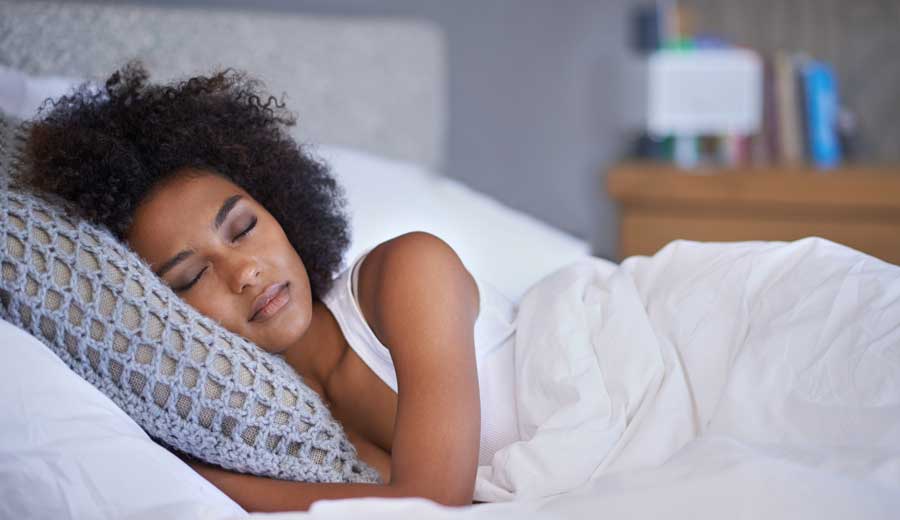How to Get More Sleep and Lose Weight

You need your beauty sleep. It’s more than the bags under your eyes; research has linked a lack of sleep with less productivity, emotional instability, wrinkles, dementia, weight gain and unhappiness. If you’re struggling to get enough sleep, maybe it’s time to get that fixed.
6 Surprising Reasons You Should Get More Sleep
- Fewer wrinkles
- Makes you smarter
- Lower risk of dementia
- Helps with weight loss
- Better able to handle stress
- Promotes happiness
Does a lack of sleep cause wrinkles and aging?
You may be aging faster because you don’t get enough sleep. According to researchers, the aging effects of your lack of sleep is likely to first be noticed on your skin. When tested, the skin of good sleepers had aged less than their poor sleeping peers. Interestingly, those who got more beauty sleep also felt more attractive. However, the more alarming effects of a lack of sleep you can’t see.
Sleep and dementia risk
Not getting enough sleep can increase your risk of dementia. Researchers have found short term sleep deprivation causes an increase in beta-amyloid (a waste product) in the fluid between brain cells. Beta-amyloid can clump together to form amyloid plaques. This is seen in Alzheimer’s disease. These plaques negatively impact how neurons communicate. The researchers found just one night of sleep causes the levels of beta-amyloid to increase 5 percent in brain regions especially vulnerable to damage in the early stages of Alzheimer’s disease.
Are there risks to burning the candle at both ends?
Structures in the brain also appear to be negatively affected by a lifestyle spent burning the candle at both ends. When over 1300 tired, but otherwise healthy, adults (age 50 years and older) underwent a magnetic resonance imaging (MRI) to determine how certain components of their brain were aging, the results were concerning. Prolonged lack of sleep appears to make the brain age faster.
Do you suffer from fatigue or excessive daytime sleepiness?
Adults who struggle with these sleepy issues perform poorly on cognitive tests, when compared to their peers, according to researchers.
Does sleep help with aging?
Yes, allowing the brain to rest is an important factor in its health. Studies show sleep plays an important role in moderating cognitive aging. In 2013, a study conducted in Finland found that adults who get enough good-quality sleep during their midlife years have better cognitive function 20 years later. Not getting enough sleep is associated with a greater risk of age-related brain atrophy and cognitive decline.
How much sleep do I need?
Recommendations vary; however, majority of health organizations suggest adults should sleep about 8 hours a day, with 6 to 7 hours being suffice for some elderly adults.
Why Can’t I Lose Weight?
Are you eating well and exercising, yet still struggling to lose weight? It’s possible the reason you can’t lose weight is because you are not getting enough sleep. “When you don’t sleep well your body is stressed, it produces cortisol (a stress hormone), and that affects the insulin response,” explains Pritikin’s Director of Nutrition, Kimberly Gomer. “That is why you can have a harder time losing weight when you don’t sleep well.” Sleep disorders and weight gain go hand in hand: a lack of sleep causes hormonal havoc in your body leading to weight gain; meanwhile a poor diet, or lack of exercise, effects how well you sleep. A healthy lifestyle, such as the one taught by the medical professionals at the Pritikin Center, can help you transform your eating, exercising and sleeping habits so you can better enjoy health and achieve weight loss.
How to fix sleep apnea
If you are struggling to get a proper night’s sleep, you’ll find it interesting that weight loss may help with sleep apnea. Researchers found that symptoms of sleep apnea disappeared in 90% of overweight adults when they lost 33 pounds. Try on a healthier lifestyle, such as the pain-free exercise and filling meal plans of Pritikin, drop some of that unwanted body weight, and enjoy some more beauty sleep.
Tired of being overweight and unhappy
Your emotions are also tied up in this. When you do not get enough sleep you have emotional deficiencies. Being tired makes it more difficult to deal with anxiety, stressful situations or depression. A lack of sleep can also increase the likelihood you’ll have negative thoughts about your self-image. Not just that feeling that the bags under your tired eyes are unattractive, but researchers have found that when the brain is tired it is more likely to experience self-disgust.
In addition, your vanity probably does not like what happens when you don’t get enough sleep. When you are tired, the corners of your mouth drop and the circulation in your skin is poor, allowing any wrinkles to be more pronounced.
Don’t let fatigue trick you down the rabbit hole of self-doubt, or feelings of unattractiveness. You are beautiful! You are capable of outstanding things including getting a good night’s sleep, achieving a healthier weight and maintaining a healthy lifestyle, such as the one you learn about at the Pritikin Center.
.
References
- The role of physical and behavioural self-disgust in relation to insomnia and suicidal ideation. J Clin Sleep Med 2019 Mar 15; 15(3): 525-527.
- Negative effects of restricted sleep on facial appearance and social appeal. Royal Society Open Science, 17 May 2017.
- Does poor sleep quality affect skin ageing? Clin Exp Dermatol 2015 Jan;40(1):17-22.
- Impact of sleep on the risk of cognitive decline and dementia. Curr Opin Psychiatry 2014 Nov; 27(6):478-483.
- β-Amyloid accumulation in the human brain after one night of sleep deprivation. Proceedings of the National Academy of Sciences, April 2018; 115(17).
- Excessive daytime sleepiness and fatigue may indicate accelerated brain aging in cognitively normal late middle-aged and older adults. Sleep Med 2017 Apr; 32: 236-243.
- Molecular ties between lack of sleep and weight gain. National Institutes of Health, 2016.